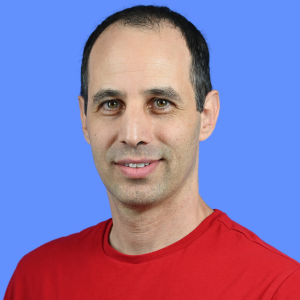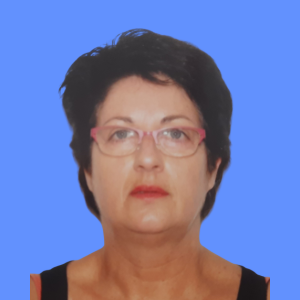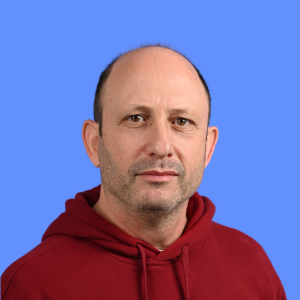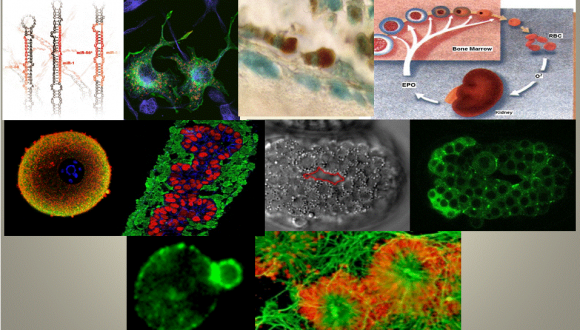Cell and Developmental Biology
Our Department is looking for excellent and highly motivated graduate students (M.Sc. and Ph.D.) and postdoctoral students for our research labs.
Principal_Investigator |
Research Area |
|
|---|---|---|
 |
The Ashkenazi lab utilizes state-of-the-art technologies to elucidate cellular mechanisms of neurological disorders. Some of these disorders progress late in life, such as Huntington's disease and Parkinson's disease. A common characteristic in these disorders is the accumulation of proteins that are not folded properly and can form aggregates in cells. We aim to elucidate novel regulatory pathways of protein homeostasis in cells to better understand the basis of these devastating diseases and to identify future therapeutic targets. |
|
|
|
 |
The Zaidel-Bar Cell Adhesion and Contractility Lab studies cell adhesion and the actomyosin cytoskeleton and how it is regulated during cell division and in tissue morphogenesis. |
 |
The Benayahu laboratory studies the Adult Mesenchymal Stem Cells (MSCs) fate in muskoloskeletal tissues with special attention to osteogenic/adipogenic pathways. MSCs derived from bone marrow or adipose tissue are analyzed for their fate during adult life, tissue repair, aging and skeletal pathologies (cancer, osteopenia, obesity). MSCs isolated cells are potential for regenerative medicine with novel scaffolds developed by us. Our research is focused on the niche and systemic cues such as hormones and biomechanics forces. We use highthroughput technologies including molecular analysis, FACS and microscopy along with novel biomarkers identified by us. | |
| Prof. Limor Broday |
The Broday laboratory studies how the ubiquitin and SUMO (small ubiquitin-like modifier) pathways control tissue morphogenesis, stress resistance and sleep-like behavior in the C. elegans model system. The research focuses on evolutionary conserved factors that mediate these post-translational modifications and on their specific substrates. We follow dynamic processes in live animals and in developing embryos using high resolution microscopy. In addition we use genetics, molecular biology and biochemistry to perform our research. |
|
| Prof. Ronit Sagi- Eisenberg |  |
The Sagi-Eisenberg laboratory studies the molecular basis of allergic and allergy related inflammatory diseases, including neurodegenerative diseeases. Our research focuses on deciphering the signaling networks that link mast cell activation with the release of allergic and inflammatory mediators and characterization of genes that could serve as cellular targets for the future development of anti allergic drugs. To this end, we combine functional genomics and phenotype driven screens of mast cells, activated to recapitulate human pathophysiologic conditions, including allergy and cancer. Research methods used include high-resolution confocal microscopy and molecular biology techniques. |
| Prof. Zvi Fishelson |  |
The Fishelson Lab investigates the mechanism of resistance of cancer cells to immunotherapy. Resistance mechanisms enable cancer cells to escape from cell death activated by antibody and complement. Several proteins (mortalin, protein tyrosine phosphatase and others) have been identified to be protectors from cell death. We are designing inhibitors for these proteins that will increase sensitivity of cancer cells to complement-dependent cytotoxicity. The most potent inhibitors will be developed further for preclinical and clinical studies of cancer therapy. |
| Prof. Limor Landsman |  |
The Landsman lab studies how insulin-producing beta-cells maintain their functionality in health, and how it is lost in diabetes. We further research how pancreatic beta-cells develop in the embryo, to facilitate a cell replacement therapy to diabetes. In order to uncover these different aspects of beta-cell biology, we focus on the role of pancreatic mesenchymal cells, a key component of the pancreas microenvironment. Using transgenic mouse models, we study how the embryonic and adult beta-cells communicate with the pancreatic mesenchyme, and how changes in this communication effect normal development and function and contribute to the progression of diabetes. |
| Prof. Chen Luxenburg |  |
The Luxenburg laboratory studies the roles of mechanical cues in stem cells ability to give rise to functional tissue during development, maintain it in the adult and repair it upon wounding. To this end we use novel technology to manipulate stem cells genetically early in development before cell fate determination as well as state of the art quantitative microscopy, and a variety of molecular techniques. |
| Prof. Drorit Neumann |  |
The Neumann laboratory studies erythropoietin (EPO), the major hormone that regulates erythropoiesis, which operates via activation of its cell surface receptor (EPO-R) on erythroid progenitor cells. Our choice to work on this EPO/EPO-R system was initiated to employ it as a model for understanding basic mechanisms of hormone/receptor function and regulation. Through that research we found that EPO may actually act as a pleiotropic hormone with anti-neoplastic, immunomodulatory activities. Our research is thus focused on both the basic mechanisms of hormone/receptor interaction, as well as the function of this hormone as an immunomodulator. The studies are based on a variety of in-vitro and murine experimental models, and include also an avenue of elucidating the relevance and possible clinical application of the results. |
| Prof. Ruth Shalgi (Emeritus) |  |
Shalgi's laboratory specializes in the field of reproduction; basic and translational projects in animal models and in human.The current research directions are: 1) The role of Fyn kinase, member of the Src family kinases, during meiosis and early events of oocyte activation, as well as in cancer cells. 2) Fertility preservation-The mechanism of chemotherapy-induced gonadal and vascular toxicity. Examining protective agents that could offset the toxic effect. 3) Regulation of angiogenesis in reproductive organs by Pigment epithelium-derived factor (PEDF) and treatment of reproductive angiogenic-related pathologies. |
| Prof. Noam Shomron |  |
The Shomron research team focuses on the analysis of genomics aimed at understanding human disease. Combining high throughput methods and bioinformatics, our team's research explores gene regulators, such as via microRNAs, in order to reach a global, systems perspective on the mechanistic roles small RNA play during health and disease. |
| Dr. Miri Danan-Gotthold |  |
The Danan-Gotthold Lab investigates how the human brain develops and why this process is disrupted in neurodevelopmental disorders such as autism and intellectual disability. We integrate computational approaches with brain organoid models and single-cell technologies to study the molecular programs driving brain formation. Our research focuses on alternative splicing, a key mechanism that allows individual genes to produce multiple proteins and plays a crucial role in neurodevelopment. By analyzing how splicing is regulated—and how it goes wrong in disease—we aim to uncover new insights into brain function and dysfunction. Ultimately, we seek to identify biomarkers and potential therapeutic strategies for these devastating disorders, bridging basic science and clinical relevance to improve outcomes for affected individuals. |
|
|
 |
Prof. Dalit Ben-Yosef is the Scientific Director of the Fertility and IVF institute in Tel-Aviv Sourasky Medical Center (Ichilov). Her stem cell research lab focuses on deciphering the early stages of embryo development in order to understand how these processes are controlled in normal development and what happens as they stray from it, which leads to severe diseases. Her research model include human embryonic stem cells (hESC) that her lab derive directly from diseased embryos, and differentiate them into different cell types and 3D organoids, in order to study the mechanisms underlying the development of genetic diseases. She also study early human development with deep learning, data visualization and advanced RNA sequencing technologies. Current research projects in the lab -
|


